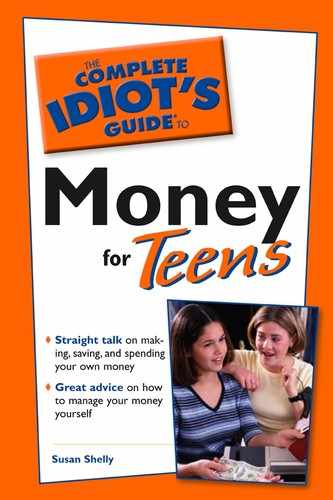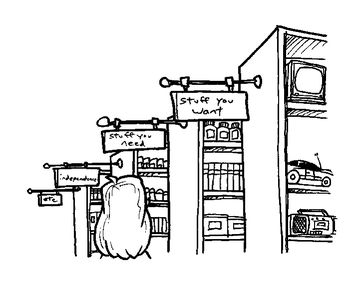
Chapter 2
Using Money to Get What You Want
In This Chapter
✧ Understanding the power of money
✧ The fuzzy line between want and need
✧ Buying stuff just for fun
✧ When need becomes very clear
✧ Intangible things we get from having money
Everyone who lives independently needs money. There’s just no way around it. Even people who don’t live entirely independently (such as you) still need money to achieve a level of independence.
When you were a baby, you didn’t care at all about money. You didn’t even know what it was. You were completely dependent on the adults who cared for you, and you cared only about your most basic needs. When you were a small child, you probably didn’t care much about money either; it simply wasn’t an issue. Everything you needed was provided for you and your wants were much fewer than they are as a teenager.
Money probably started to become an issue for you at about age seven or eight when you began to realize that money’s the stuff that can get you want you want. Your needs at that age were still being taken care of, so you didn’t have to think about money as it related to buying food, providing your shoes, or paying the rent or mortgage. You began to focus instead on the non-necessary things that you then understood you could buy if you had money.
It probably was at about this age that you understood the 10-dollar bill your aunt gave you for your birthday could buy you that Ninja Turtle set you’d been scoping out at the toy store, or that tennis outfit, complete with a racket and sneaks, for your favorite Barbie doll.
When that realization occurs, money takes on a new importance and life is never the same. All of the sudden, you sense the power of money. In this chapter, we take a hard look at money and the things it can get you. Some of those things are tangible—you can hold them in your hand or put them in your room. Others are intangible—you can’t see them or physically have them but they’re just as important.
Buying Stuff You Need—or Think You Need
It’s fair to say that most teenagers spend their own money on stuff that they want rather than on stuff they need. This is because most teens have parents or other adults who provide their basic needs for them. Chances are your shelter, food, and at least some of your clothing needs are taken care of for you.
It’s a good bet that you don’t pay for your own schooling, to see the doctor when you’re sick, or for the glasses you need because you’re nearsighted. I doubt you footed the bill for the braces you had when you were 10 or 11, or for that dictionary your third-grade teacher recommended that you have to use at home.
I would venture that most teens don’t have to worry about most of their needs and probably get a lot of help with their wants, too. There are a lot of costs involved in that period between the time you’re 12 and the time you’re 20. Expenses such as fees to participate on athletic teams, class trips, birthday presents for friends, recreational activities, CDs and video games, dance lessons, camps, music lessons, and so on, add up fast.

Imagine That
Although many children and teens enjoy the benefits and luxuries of belonging to a middle-class family, there still are more than 12 million children in the United States living in poverty, according to The Children’s Defense Fund.
None of these expenses is a real need, although to you they might seem to be. Because your parents probably pay for your basic needs and a lot of your wants, too, you are able to supplement your wants and needs with money of your own.
When basic needs are satisfied, we tend to escalate wants into needs. If you haven’t had a meal for three days because you have no money to buy food, you absolutely know that food is a need and the latest Christina Aguilera CD isn’t. But, if you get all the food you want every day and you never have to think about being hungry, you’re likely to place a great deal more importance on the CD.
Buying Stuff We Don’t Need, But Want Anyway
There’s nothing wrong with buying things that we want, as long we keep it to a reasonable limit and keep our spending habits in perspective. Sometimes it’s fun to go out and buy something you know you don’t need, just because you want it. We’re extremely fortunate to live in a society where many of us are able to do that from time to time. It feels good sometimes to buy something that you really like, even though you know full well that you could live without it.
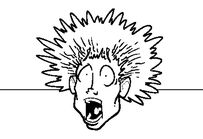
Scary Stuff
Beware of the temptation to buy and buy and buy. Too much neat stuff can quickly become a liability when you can no longer move around in your room because of it.
However, if you max out your credit card or run up more than you should on your parent’s credit card, or continually spend all the money you have on frivolous items, you’re obviously buying too many things that you want. The trick is to balance buying what you need with what you know you don’t need, but want anyway.
Our homes are filled with decorative items that we buy strictly because we want them—not because we need them. Look around your own room. How many clothes are in your closet that you bought (or got somebody to buy for you) because you liked them, not because you needed them?
The teenager’s room in my own house is filled with glittery lotions, dozens of bottles of nail polish, and a box overflowing with hair accessories. There are scented candles and a glittery star night light. There’s a light that rotates when it’s turned on, allowing different views of dolphins. There’s a CD player, a portable CD player, and CDs spread across a table and the floor. There are at least 100 books on her bookshelf, many of which she’s bought for herself.
None of these things are necessary, but they’re fun, and they help to make my daughter’s room her own space. As long as unnecessary spending doesn’t get out of hand or interfere with buying what you really do need, it’s okay.
Knowing the Difference Between Want and Need
As stated earlier, the difference between want and need becomes fuzzy when our needs are met and we have money to spend on non-necessities. All of the sudden, you feel as if you really need that black leather jacket, even though you already have two warm coats.
If you think carefully about it, chances are you’ll realize that most, if not all of the things you say you need really are things you can live very well without.
Someone once told me that the difference between want and need became very clear to him in the emergency room after he’d been in a serious motorcycle accident. His wants cleared away, he said, completely replaced with a single need—to live. The loss of his motorcycle didn’t matter, nor the thought of anything he owned. He needed only to live.

Money Matters
Make a list of everything you think you need at this particular time. Then go over each item and really ask yourself if it’s a need or a want. Chances are you’ll discover the great majority of items on your lists are wants, not needs.
Hopefully, you have a sense of the difference between need and want and won’t have to face adverse circumstances to make the concept clear to you. Remember that many of the things you really need—love, friendship, hope, and a feeling of security—aren’t dependent on money.
Money Gets You Stuff You Can’t See
You know that money gets you stuff (or allows others to get you stuff) that you really need—your food, medical care, clean water, shelter, and clothing. You also know that money gets you stuff that you don’t need, but want anyway. Did you ever stop to think about the things money gets you that you can’t see? In our society, money gets you power. It gets you respect. It opens doors that otherwise might remain closed. It gets you independence, enables you to have choices, and sometimes causes a great deal of trouble and heartache. Let’s consider some of the nontangible things that money brings.

Scary Stuff
Although many people who have money are deserving of respect, be careful to not assume that respect and money are interchangeable. Look instead for qualities such as honesty, sincerity, integrity, and kindness.
Power and Status
Money is a source of power and status. People who make a lot of money—and have a lot of money to spend—often are considered to be powerful people because of it.
Even kids recognize at an early age that having money to spend provides them with a feeling a power. It allows them to take control of a situation. A lot of money sometimes allows people to control other people as well. Kids learn this feeling of power from adults, whom they observe showing off purchases or talking admirably about their neighbor’s new BMW. They quickly associate money with success and power.
The well-respected business magazine, Forbes, releases a list each year called Forbes Top CEOs: Corporate America’s Most Powerful People. As you might imagine, the list is based on how much money each CEO has been able to make during the preceding year.
We think of politicians as being powerful people. Many of them also are wealthy people who have used their money to run campaigns and get elected. Those who don’t have money of their own must raise money or get support from their respective political parties.
Not all powerful people are rich; some have been very poor. The power of Rosa Parks, the brave African American woman from Alabama who refused to give up her seat on a bus to a white man, or the power of Mother Theresa, the nun who worked tirelessly to care for the world’s poorest and most desperate people, came from courage and conviction. However, these examples, and others like them, are the exceptions. Whether it’s right or not, money and power go hand in hand in this country.
Respect
We tend to look up to people who have a lot of money, whether or not their characters warrant it. Young drug dealers on city streets often have said that they enjoy the respect they get from having money and, as a result, power.
People who make or win a lot of money in a short time often recognize a new sense of respect shown toward them. It’s not that they’ve changed or are any more worthy of respect than they were before their financial situations changed. The respect they’re seeing comes merely from the fact that they now have money. Of course, many people who don’t have a lot of money are very worthy of respect, and enjoy the respect they deserve.
Independence
One of the really good things having money does for you is to allow you independence. It’s a great feeling to have enough money to do what you want without having to ask somebody for help.
If you work and earn money, you’ve probably enjoyed a sense of this feeling of independence. As you get older and make even more money, you’ll enjoy the transition you’ll make from dependence to independence.
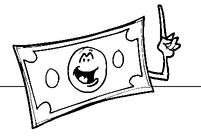
Money Matters
Even young children quickly learn that having a little money of their own makes them more independent. Consider the second grader who, without asking her mother, remembers every Thursday to take 50 cents to school so she can buy ice cream after lunch. She’s taken a step toward independence by doing so.
Choices
Another great value of money is that it gives you choices. Consider this: If the salary you get from your minimum-wage job is the only income you have and you have two young children to support, your choices are going to be extremely limited. You won’t be able to decide to upgrade your apartment, send your children to a better day-care center, or to take a vacation. Your only choice will be to manage, or to try to find a better job so you’ll make more money.
As an adult, having money allows you a great many choices and possibilities. You can consider taking a trip, buying a piano, or moving from your apartment to a home. You can choose to go back to school, switch jobs or careers, or have another child.
As a teenager, your choices are more limited, but having money does provide you with options you might not have without it. Money is necessary to have choices. The freedom that money provides is one of the best things about it.
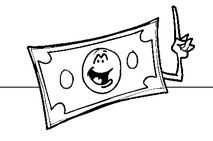
Money Matters
Having money is a great liberator and can limit worries about the future. For instance, a couple who has $100,000 invested in a sound fund earmarked for their child’s college tuition probably has fewer concerns about their financial future than a couple who hasn’t saved a dime toward college tuition.
Worries
When you never seem to have enough money, it’s hard to imagine that there’s a downside to having lots more than you need, but there are actually a lot of downsides. Money can provide a sense of financial security and give you options and choices, but it also can be the source of a lot of headaches.
Even when you just have a moderate amount of money, you need to keep track of it and decide what you’ll do with it. You want to make sure it’s safe, and hopefully make it work for you to make more money. Most people deal well with these issues because they don’t have extraordinarily large amounts of cash. People without much money who have suddenly acquired large amounts, however, often have difficulty adjusting to their change of status and managing their newly found wealth.

Imagine That
According to Jonathan Freedman’s book Happy People, there’s a high proportion of unhappy doctors and lawyers as compared to those in other professions. This is interesting, considering the fact that doctors and lawyers generally make a lot of money compared to many other professions.
Sometimes people who have a lot of money become very suspicious because they think everyone they meet is trying to get a piece of their wealth. Others obsess over their money, never really enjoying it because they’re too worried about losing it.
Money has been the downfall of many, many people. There are those who never have enough, so they embezzle from their companies or bilk their clients out of their lives’ savings. There are those who get so far in debt they become completely hopeless and end up killing themselves.
When kept in perspective, money is a useful commodity that can bring happiness and comfort to your life. When it becomes overly important, however, it can quickly cease to be a good thing and become a real burden.
What Happens When You Don’t Have Enough
Although having money can bring accompanying problems, not having enough money can be an even greater source of trouble. Not having enough money doesn’t mean that you won’t be able to buy a pair of shoes to go with your new dress for the dance. It doesn’t mean having to stay at home for a night while your friends go out to dinner because you spent all your money on a video game. Not having enough money is way more serious than those things.
Try to imagine what it would be like if your family didn’t have enough money to pay for oil for the furnace. Think about waking up in a cold house that you know will remain cold all day. Or, picture your little sister being very, very sick, but your parents are unable to take her to the doctor because there is no money to pay.
People who don’t have enough money suffer, both in America and around the world. In some countries, virtually everyone is poor. About 40,000 people around the world, most of them children, die every day from hunger or hunger-related diseases. Even in America, nearly 13 percent of people are considered to be living in poverty.
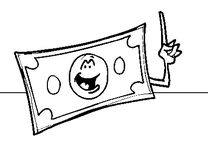
Money Matters
To get an idea of what real poverty is like, go to The Great Depression at www.geocities.com/Athens/Olympus/1545.
Being aware of what some people don’t have can help to make you more appreciative of what you do have. And, recognizing the difference between want and need can help you to better manage your money.
The Least You Need to Know
✧ Most teens aren’t responsible for their basic needs such as food and shelter, so the money they spend tends to be for things they want but don’t actually need.
✧ Buying something just because you want it is okay, as long as it doesn’t get out of control.
✧ There’s a fine line in the minds of many people between want and need, but the distinction often becomes clear in times of great adversity or emergency.
✧ Money can help us get both tangible items such as clothing and CDs, and intangible things such as independence and respect.
✧ There are many people throughout the world who are miserable because they don’t have enough money.
..................Content has been hidden....................
You can't read the all page of ebook, please click here login for view all page.
